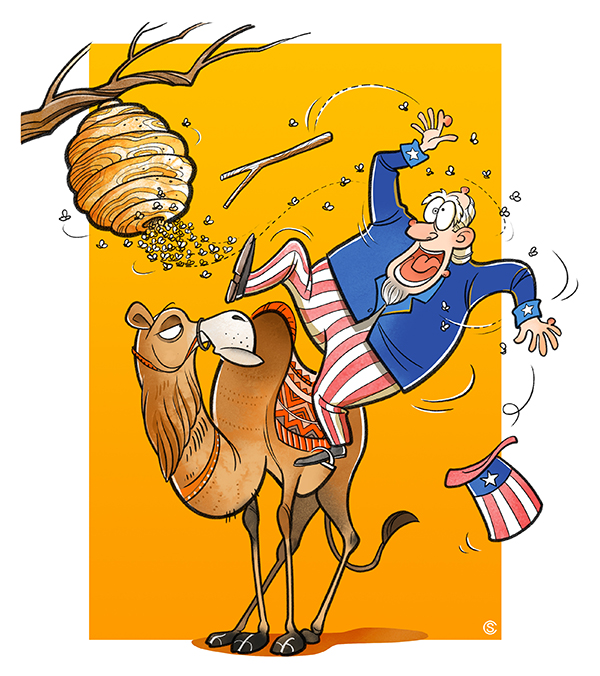US escalation must be countered by reason and diplomacy
By Elyar Najmehchi B.A. | chinadaily.com.cn | Updated: 2020-01-09 11:32

The killing of Iranian General Qasem Soleimani in Iraq by a US drone as ordered by President Trump on Jan 3 has created international waves, mostly of condemnation or criticism. The questionable legality of the killing concerning international law and also its intended purpose compared to the actual results have been subject to scrutiny, even with many representatives of nations allied to the US calling the move counterproductive to their goals in the Middle East, such as countering terrorism and easing tensions.
Europe’s top leaders - Merkel, Macron and Johnson - have called for de-escalation and restraint from all parties involved.
Iran seems to have come out of this even more resolute and determined to oppose the US, threatening with counteractions which in turn could lead to a further escalation of the conflict. This was something that Trump was originally opposed to, with the promise to pull troops out of the Middle East during the election and even criticizing Obama he would "start a war with Iran to get reelected", something that Trump himself now seems to aim at, judging from recent events.
However, regarding the reputation and reliability of US foreign policy behavior, the handling of the outcome of the attack has been nothing but a PR disaster on the side of the United States. While Iran seems to be more determined and domestically united than ever before, US public opinion on the attack seems divided to say the least, with many lawmakers condemning the act, and Congress criticizing the president for not informing them about it beforehand. The fact that the president is able to order an execution of a foreign leader of a country the US is not officially at war with, after reportedly being "offered a menu of options by the Pentagon" and personally choosing the most extreme option without consulting other legislators, exposes not only the incompetence of a leader in power, but also calls into question the structure of the US legislative system, which allowed this to happen. The president the proceeded to "inform" Congress via Twitter that, should Iran retaliate, he would strike back, "perhaps in a disproportionate manner".
The Iranians have now not only united in mourning over the death of General Soleimani, who according to the Iraqi prime minister was on a mission to ease tensions with Saudi Arabia as reported by the Daily Mail (as opposed to US claims that he was planning an attack on Americans), but also in the condemnation of US behavior. Trump’s threats to even attack Iranian cultural sites have now brought together Iranians who might have had opposing political opinions before, condemning what is classified as a war crime in the 1972 convention to protect the world’s natural and cultural heritage which was signed by both countries.
With this threat, Trump targeted Iranian identity, which is shared by all citizens, instead of only a certain political class or the military -- the threat could be interpreted as directly targeted toward the Iranian people. Even if the defense minister assured the US will act "according to international law", again contradicting the president, just issuing the threat has insulted and outraged many Iranians.
This in many respects constitutes a large failure in US political aims to destabilize Iran domestically, trying to encourage an internal regime change (something it has attempted in many countries in the past).
The fallout has been catastrophic for the US across the board: even Iraq, which in the past has been an enemy of Iran, has condemned the killing as a violation of its national sovereignty, with high-ranking Iraqi military personnel also among the victims of the attack. Parliament has thus, in a rare move of solidarity with Iran, voted to expel all US military personnel from its country.
Yet again, the US response has been puzzling, constantly contradicting itself. A letter that has been circulated by the US military command, which was aimed toward Iraqi legislators and seemingly announced the withdrawal of troops, was later renounced again by US legislators as not valid. Instead, President Trump has threatened Iraq, which has just suffered an attack on its national sovereignty, with economic sanctions -- seemingly a favorite measure of his -- should they go through with the expelling of US troops. Furthermore, Iran has announced it would stop adhering to the conditions of the Iran deal in light of the current situation, constituting a major blow to the nations who are still committed to it, all triggered by US behavior.
In conclusion, the incident has triggered a spiral of events, which step by step seem to contribute to a total deterioration of peaceful relations in the Middle East and run counterproductive to previously set goals by most parties involved. The legally questionable killing of Soleimani and also the contradictory and in many aspects apparently incompetent handling of its fallout by the US all expose many of the deep problems in its legislature and foreign policy, contributing to global destabilization. It represents another major blow to the global reputation and reliability of the US. Other countries not directly involved may be closely watching and taking notes, and in the future might think twice when engaging in deals with the US. Acts which do not help include that of US Representative Paul Gosar, who shared what could essentially be fake news by posting a fabricated and photo-edited image of former US president Obama and Iranian President Rouhani shaking hands, with the caption "The world is a better place without these guys in power".
China's response has been the rational voice these days, urging for the easing of tensions and appealing to diplomacy and noninterventionism.
The author is a masters' degree student in Economy and Society of East Asia at the University of Vienna.
The opinions expressed here are those of the writer and do not represent the views of China Daily and China Daily website.
























